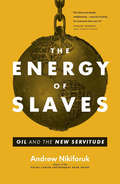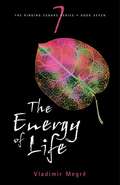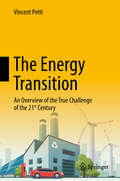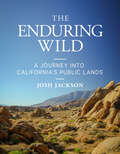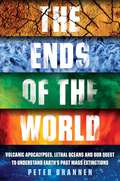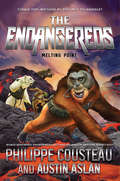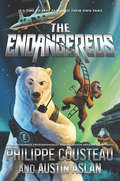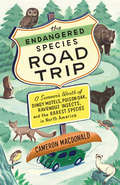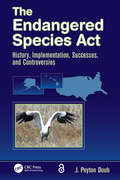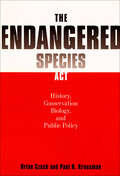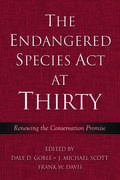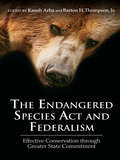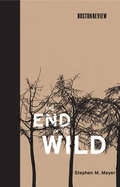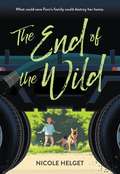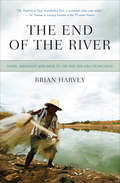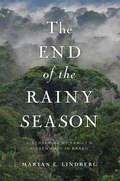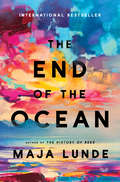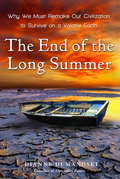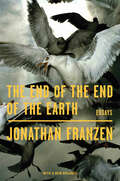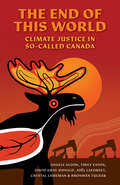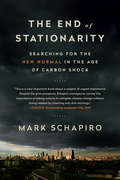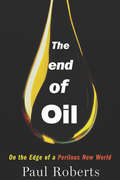- Table View
- List View
The Energy of Slaves: Oil and the New Servitude
by Andrew Nikiforuk&“A robustly researched and smoothly written overview of the many challenges confronting our devotion to fossil fuels&” from the author of Tar Sands (Quill & Quire). Ancient civilizations relied on shackled human muscle. It took the energy of slaves to plant crops, clothe emperors, and build cities. Nineteenth-century slaveholders viewed critics as hostilely as oil companies and governments now regard environmentalists. Yet the abolition movement had an invisible ally: coal and oil. As the world&’s most versatile workers, fossil fuels replenished slavery&’s ranks with combustion engines and other labor-saving tools. Since then, cheap oil has transformed politics, economics, science, agriculture, and even our concept of happiness. Many North Americans today live as extravagantly as Caribbean plantation owners. We feel entitled to surplus energy and rationalize inequality, even barbarity, to get it. But endless growth is an illusion. In this provocative book, Andrew Nikiforuk, winner of the Rachel Carson Environment Book Award, argues that what we need is a radical emancipation movement that ends our master-and-slave approach to energy. We must learn to use energy on a moral, just, and truly human scale. Published in Partnership with the David Suzuki Institute &“In his cautionary tale about the evils of oil . . . Nikiforuk makes his case for impending doom if we don&’t mend our energy-spending ways.&” —The Star &“In this cogently argued book, Andrew Nikiforuk deploys a powerful metaphor. Oil dependency, he writes, is a modern form of slavery—and it&’s time for a global abolition movement.&” —Taras Grescoe, author of Shanghai Grand &“A startling critique that should rouse us from our pipe dream of endless plenty.&” —Ronald Wright, author of On Fiji Islands
The Energy of Life (The Ringing Cedars Series #7)
by Vladimir Megré John Woodsworth Leonid SharashkinMan's life! On what or on whom does it depend? Why do some become emperors or regimental commanders, while others are obliged to fend for scraps at garbage dumps? One opinion holds that each person's fate is pre-determined from birth. That would make Man nothing more than an insignificant cog in some mechanised system, and not the highly organised creation of God.
The Energy Transition
by Vincent PetitAgainst the backdrop of rapid advances in the energy sector, this book provides a concise overview of the complex challenges in the energy paradigm today, which revolve around the seemingly unsolvable energy equation. The author, an experienced energy professional, combines the various aspects of the energy transition into a single perspective. While highlighting a number of salient problems, he also explores grounds for optimism that these challenges can and will be met. After establishing the historical context, the book presents an analysis of today's energy industry, different energy sources, countries and determinants of energy demand, supplementing all sections with a wealth of global and local data. It subsequently proposes measures to solve the energy equation and a roadmap for a sustainable future, based on more efficient energy use, cleaner energy production and advanced technologies.
The Enduring Wild: A Journey into California's Public Lands
by Josh JacksonA galvanizing road trip across California's immense public wilderness from a beloved adventurer."The Enduring Wild is a call to look beyond the surface, embrace the deep connections that tie us to our public lands, and commit to safeguarding them for future generations." —QT Luong, author of Treasured Lands: A Photographic Odyssey Through America's National ParksIt all began with a camping trip. Outdoor enthusiast Josh Jackson had never heard of "BLM land" before a casual recommendation from a friend led him to a free campsite in the desert—and the revelation that over 15 million acres of land in California are owned collectively by the people. In The Enduring Wild, he takes us on a road trip spanning thousands of miles, crisscrossing the Golden State to seek out every parcel of public wilderness therein belonging to the federal Bureau of Land Management, from the Pacific shores of the King Range down to the Mojave Desert. Over mountains, across prairies, and through sagebrush, Jackson unravels the stories of these lands. He tells of the Indigenous peoples who have called them home for millennia, of the extractivist threats that imperil them today, and of the grassroots organizers and political champions who have rallied to their common defense to uphold the radical mandate to protect these natural treasures for generations to come. For the adventurers, campers, explorers, map readers, road trippers, nature enthusiasts, and public lands lovers out there, The Enduring Wild is an indispensable invitation to know these places more deeply and to embrace our common inheritance. Illustrations by Rebekah Nolan.
The Ends of the World: Volcanic Apocalypses, Lethal Oceans and Our Quest to Understand Earth’s Past Mass Extinctions
by Peter BrannenApocalypse, now? Death by fire, ice, poison gas, suffocation, asteroid. At five moments through history life on Earth was dragged to the very edge of extinction. Now, armed with revolutionary technology, scientists are uncovering clues about what caused these catastrophes. Deep-diving into past worlds of dragonflies the size of seagulls and fishes with guillotines for mouths, they explore how – against all the odds – life survived and what these ominous chapters can tell us about our future.
The Endangereds: Melting Point
by Austin Aslan Philippe CousteauIt’s time for animals to take fate into their own paws! The Endangereds: The Melting Point is the second book in a thrilling new adventure series by world-renowned environmentalist and Emmy-nominated host of Xploration Awesome Planet Philippe Cousteau and award-winning TURBO Racers author Austin Aslan. Around the world, temperatures are rising, ice caps are melting, and innocent animals are in trouble. Humans had their chance to fix it and failed. It’s time for the animals to take their fate into their own paws. It’s time for . . . the Endangereds. When word reaches the Endangereds that one of the last of a species of nearly extinct sloths is in trouble, the team don’t hesitate to strap on their gear, fire up their helicopter, and rush off into action. But this time their mission is complicated by the appearance an unexpected foe—an animal faction bent on saving the world by making humans extinct. It’s the toughest assignment the Endangereds have faced yet as the faction will stop at nothing to take back the world, one biome at a time. It’s a rollicking new high-stakes turn in the thrilling environmental-adventure series by Philippe Cousteau, the world-renowned environmentalist and Emmy-nominated host of Awesome Planet, and Austin Aslan, the award-winning author of the TURBO Racers book series.
The Endangereds
by Austin Aslan Philippe CousteauIt’s time for animals to take fate into their own paws! The Endangereds is the first book in a thrilling new adventure series by world-renowned environmentalist and Emmy-nominated host of Xploration Awesome Planet Philippe Cousteau and award-winning TURBO Racers author Austin Aslan. Innocent animals are in trouble: temperatures are climbing, tides are rising, and nature is suffering. Someone needs to step in to rescue animals from extinction. Someone needs to turn this mess around, before it’s too late.And that someone is . . . the Endangereds, the unlikeliest heroes you’ll ever meet—a superstrong polar bear, a pangolin with a genius for engineering, an extremely sarcastic narwhal, and an orangutan with a big dream. Together, these four daredevils are determined to save endangered species across the globe, no matter what the risk. Rappelling into an underground cavern to save the day? No problem. Looping video footage to sneak through buildings unnoticed? Got it covered. Opening a doorknob? Okay, pretty hard without thumbs. But don’t worry. No matter what it takes, the Endangereds will get the job done. But when two of their friends get kidnapped by a villain with a dastardly agenda, the team finds themselves up to their snouts in trouble. Can the Endangereds save the day? Or will this villain put humans and animals alike on the extinction list? The A-Team meets the animal kingdom in the first book in the thrilling new adventure series from the host of Xploration Awesome Planet Philippe Cousteau and award-winning author Austin Aslan.
The Endangered Species Road Trip
by Cameron MacdonaldBill Bryson meets John Vaillant in this life list quest to see the rarest species in North America.Crammed into a minivan with wife, toddler, infant, and dog, accompanied by mounds of toys, diapers, tent, sleeping bags, and other paraphernalia, Cameron MacDonald embarks on a road trip of a lifetime to observe North America's rarest species. In California, the family camps in the brutally hot Mojave, where he observes a desert tortoise-"the size and shape of a bike helmet and the colour of gravel" sitting motionless in the shade of a scrubby sagebush. In Yellowstone, after driving through unseasonal snow, he manages to spot a rare black wolf and numerous grizzlies, which, unfortunately, call forth a crowd of "grizzly gawkers." The journey takes the MacDonald family from British Columbia, along the west coast of the U.S., through the Southwest and Florida, up the east coast of the U.S., and finally to eastern Canada and then back home to BC.Along the way, MacDonald offers fascinating details about the natural history of the endangered species he seeks, as well as threats like overpopulation, commercial fishing, and climate change that are driving them towards extinction.
The Endangered Species Act: History, Implementation, Successes, and Controversies
by J. Peyton DoubThe complex regulations of the Endangered Species Act can be challenging for environmental professionals who must comply with them or assist clients in compliance. This volume discusses the Act using clear scientific prose that all professionals can readily comprehend. It explores the history and the basic scientific theory underlying the Act. It provides an overview of its key provisions and examines the Act in the context of other key environmental planning statutes. The book also details the regulatory processes faced by other government agencies and private developers who must routinely ensure that their actions are in compliance.
The Endangered Species Act: History, Conservation Biology, and Public Policy
by Brian Czech Paul R. KrausmanThe new model of policy design theory frames the discussion regarding the frequently analyzed Endangered Species Act (ESA) in this historical perspective.Since the 1970s, the Endangered Species Act (ESA), by virtue of its regulatory impact, has been a frequent subject of policy analysis. In this comprehensive history and critique of the ESA, Brian Czech and Paul R. Krausman incorporate the new model of policy design theory to frame a larger discussion about conservation biology and American democracy.Czech and Krausman provide a historical background of endangered species policy that integrates natural history, socioeconomic trends, political movements, and professional developments. Outlining the controversies surrounding the ESA, they find a connection between challenges to species conservation and challenges to democracy. After an assessment of ESA analyses that have been performed from traditional perspectives, they engage policy design theory to review the structural logic of the ESA, analyzing each clause of the legislation for its application of the fundamental elements of democracy. To address the technical legitimacy of ESA, they propose two new genetic considerations—functional genome size and molecular clock speed—to supplement phylogenetic distinctiveness as criteria with which to prioritize species for conservation. Next, they systematically describe the socioeconomic context of ESA by assessing and classifying the causes of species endangerment.A hybrid of policy analysis and ecological assessment, The Endangered Species Act: History, Conservation Biology, and Public Policy will appeal to scholars and students in the fields of natural resource policy and law, conservation biology, political science, wildlife ecology, and environmental history, and to professionals at agencies involved in wildlife conservation.
The Endangered Species Act: History, Conservation Biology and Public Policy
by Brian Czech Paul R KrausmanThe new model of policy design theory frames the discussion regarding the frequently analyzed Endangered Species Act in this historical perspective.Since the 1970s, the Endangered Species Act (ESA), by virtue of its regulatory impact, has been a frequent subject of policy analysis. In this comprehensive history and critique of the ESA, Brian Czech and Paul R. Krausman incorporate the new model of policy design theory to frame a larger discussion about conservation biology and American democracy. Czech and Krausman provide a historical background of endangered species policy that integrates natural history, socioeconomic trends, political movements, and professional developments. Outlining the controversies surrounding the ESA, they find a connection between challenges to species conservation and challenges to democracy. After an assessment of ESA analyses that have been performed from traditional perspectives, they engage policy design theory to review the structural logic of the ESA, analyzing each clause of the legislation for its application of the fundamental elements of democracy. To address the technical legitimacy of ESA, they propose two new genetic considerations-functional genome size and molecular clock speed-to supplement phylogenetic distinctiveness as criteria with which to prioritize species for conservation. Next, they systematically describe the socioeconomic context of ESA by assessing and classifying the causes of species endangerment. A hybrid of policy analysis and ecological assessment, The Endangered Species Act: History, Conservation Biology, and Public Policy will appeal to scholars and students in the fields of natural resource policy and law, conservation biology, political science, wildlife ecology, and environmental history, and to professionals at agencies involved in wildlife conservation.“Interesting for anyone concerned about the preservation of species and, more generally, the global environment . . . a good explanation of the statute, a wonderful and often entertaining description of how we view and rank nonhuman species, and a provocative critique of the very policy analytic framework the authors have employed.” —Joseph F. C. DiMento Environment“Czech and Krausman are effective and original scholars. The Endangered Species Act: History, Conservation Biology, and Public Policy is both a treatise on policy assessment and an excellent history, assessment, and discussion of the ESA itself. Those interested in natural resources policy and those interested specifically in the ESA will want to read this book.” —Jack Ward Thomas, The University of Montana, Chief Emeritus, U.S. Forest Service
The Endangered Species Act at Thirty: Renewing the Conservation Promise
by Dale D. Goble J. Michael Scott Frank W. DavisThe Endangered Species Act at Thirty is a comprehensive, multidisciplinary review of issues surrounding the Endangered Species Act, with a specific focus on the act's actual implementation record over the past thirty years. The result of a unique, multi-year collaboration among stakeholder groups from across the political spectrum, the two volumes offer a dispassionate consideration of a highly polarized topic. Renewing the Conservation Promise, Volume 1, puts the reader in a better position to make informed decisions about future directions in biodiversity conservation by elevating the policy debate from its current state of divisive polemics to a more-constructive analysis. It helps the reader understand how the Endangered Species Act has been implemented, the consequences of that implementation, and how the act could be changed to better serve the needs of both the species it is designed to protect and the people who must live within its mandates. Volume 2, which examines philosophical, biological, and economic dimensions of the act in greater detail, will be published in 2006. As debate over reforming the Endangered Species Act heats up in the coming months, these two books will be essential references for policy analysts and lawmakers; professionals involved with environmental law, science, or management; and academic researchers and students concerned with environmental law, policy, management, or science.
The Endangered Species Act and Federalism: Effective Conservation through Greater State Commitment
by Jr. Barton H. Thompson Kaush ArhaStates today play a major role in implementing and enforcing environmental laws such as the Clean Air Act, Clean Water Act, and the Resource Conservation and Recovery Act. A thirty year review of ESA identified state leadership in species conservation as a necessary element in better conserving the nation‘s imperiled species, yet the theoretical and practical reasons and applications of an enhanced state role are little understood and have not been subjected to any meaningful analysis. This book, for the first time, presents the legal and policy analysis for federalism considerations in implementing ESA. The book undertakes a comprehensive analysis of the economic rationale for federalism in ESA administration; compares administration of ESA to other major environmental statutes; reviews various tools under the existing Act to enhance state role in species conservation; evaluates major case studies to determine roles the state can play in species conservation and recovery; and concludes with policy recommendations to encourage greater state involvement in species conservation.
The End of the Wild (Boston Review)
by Stephen M. MeyerA wake-up call that argues that although it may be too late to save biodiversity, we can take steps to save our ecosystems. With the extinction rate at 3000 species a year and accelerating, we can now predict that as many as half of the Earth's species will disappear within the next 100 years. The species that survive will be the ones that are most compatible with us: the weedy species—from mosquitoes to coyotes—that thrive in continually disturbed human-dominated environments. The End of the Wild is a wake-up call. Marshaling evidence from the last ten years of research on the environment, Stephen Meyer argues that nothing—not national or international laws, global bioreserves, local sustainability schemes, or "wildlands"—will change the course that has been set. Like it or not, we can no longer talk about conserving nature, only managing what is left. The race to save biodiversity is over. But that doesn't mean our work is over. The End of the Wild is also a call to action. Without intervention, the surviving ecosystems we depend on for a range of services—including water purification and flood and storm damage contro—could fail and the global spread of invasive species (pests, parasites, and disease-causing weedy species) could explode. If humanity is to survive, Meyer argues, we have no choice but to try to manage the fine details. We must move away from the current haphazard strategy of protecting species in isolation and create trans-regional "meta-reserves," designed to protect ecosystem functions rather than species-specific habitats.
The End of the Wild
by Nicole HelgetA modern, beautifully written story set against the backdrop of the controversial issue of fracking that explores the timely themes of poverty, environmental protection, what makes a family, and finding your place in the world.Eleven-year-old Fern's rundown home borders a pristine forest, where her impoverished family hunts and forages for food. It's also her refuge from the crushing responsibility of caring for her wild younger brothers and PTSD-stricken stepfather. But when a fracking company rolls into town, Fern realizes that her special grove could be ripped away, and no one else seems to care.Her stepfather thinks a job with the frackers could help pull the family out of poverty. Her wealthy grandfather--who wants to take custody of Fern and her brothers--likes the business it brings to his manufacturing company. Facing adversity from all sides, can one young girl make a difference in the fate of her family and their way of life?
The End of the Wild
by Stephen M. MeyerToday the guiding hand of natural selection is unmistakably human. With these words Stephen M. Meyer begins a stunningly clear-eyed view of the extinction crisis. Marshaling evidence from the last ten years of research, he argues that nothing-not national or international laws, global bioreserves, local sustainability schemes, or "wildlands"-will change the course we have set: the loss of half of the earth's species by the end of the century. We will come to share the planet only with species that thrive in human-dominated environments.
The End of the River: Dams, Drought and Déjà Vu on the Rio São Francisco
by Brian Harvey&“[Harvey] may have created a new literary genre: science travel writing . . . travelogue, autobiography, history, and even fantasy romp alongside the biology&” (Quill & Quire). When biologist Brian Harvey saw a thousand fish blundering into a Brazilian dam, he asked the obvious: What&’s going to happen to them? The End of the River is the story of his long search for an answer. Harvey takes readers from a fisheries patrol boat on the Fraser River to the great Tsukiji fish market in Japan, with stops in the Philippines, Thailand, and assorted South American countries. Finally, in the arid outback of northeast Brazil, against a backdrop of a multi-billion-dollar river project nobody seems to want, he finds a small-scale answer to his simple question. In recounting his journey, he populates his story with characters both real and imagined, human and otherwise—a six-foot endangered catfish; a Canadian professor with a weakness for Thai bar girls; a chain-smoking Brazilian with a passion for her river; a drug-addled stick-up artist. The End of the River is about fishermen, fish farmers, and fish cops; there are scientists and shysters as well as a few Colombian narcotráficos and some very drunk, very hairy Brazilian men in thongs. From the founder of the World Fisheries Trust, Harvey introduces a new kind of writing about the environment, as far off the beaten track as you can get in a Land Rover driven by a female Colombian biologist whose favorite expression is &“No hay via!&”—meaning, &“no road!&” &“[A] freewheeling and vividly written essay on the mysteries and longings of what it is to be human in a world of cynicism and loss—and more significantly, what it is to be hopeful, to persevere, in the search for redemption and beauty . . . A brilliant and instructive book . . . recalls the travel writing of one of Harvey&’s heroes, Sir Richard Burton.&” —The Globe and Mail (Toronto)
The End of the Rainy Season: Discovering My Family's Hidden Past in Brazil
by Marian LindbergMarian Lindberg grew up being told that Walter Lindberg, the man who raised her father, was a brave explorer who had been murdered in the Amazon. She took her father's claims at face value, basking in her exotic roots, until she started to notice things. The unverified legend became a riddle she couldn't solve.As Lindberg moved from journalism to law, fell in love, and sought a family of her own, her father repeatedly interfered. He had a closed vision of his family, and she-unlike the silent Walter-was breaking out. Yet her father's story of the past haunted Lindberg. Long after her father's death, Lindberg set off for the Amazon, determined to find out the truth about Walter. Aided by generous Brazilians who adopted her search as if it were their own, she discovered as much about herself and her family as about Walter, whose true role in Brazil's history turned out to be unexpected and deeply troubling.Sharply observant, wrought with honesty, and sweeping in its ambitions, The End of the Rainy Season is a powerful examination of identity and human relationships with nature, and between one another.
The End of the Ocean: A Novel
by Maja Lunde“Two stories on the impact of climate change intersect in this thoughtful and suspenseful novel. . . . convincingly detailed and quietly wrenching . . . powerful.” —Kirkus Reviews, starred reviewFrom the author of the number-one international bestseller The History of Bees, a captivating story of the power of nature and the human spirit that explores the threat of a devastating worldwide drought, witnessed through the lives of a father, a daughter, and a woman who will risk her life to save the future.In 2019, seventy-year-old Signe sets sail alone on a hazardous voyage across the ocean in a sailboat. On board, a cargo that can change lives. Signe is haunted by memories of the love of her life, whom she’ll meet again soon.In 2041, David and his young daughter, Lou, flee from a drought-stricken Southern Europe that has been ravaged by thirst and war. Separated from the rest of their family and desperate to find them, they discover an ancient sailboat in a dried-out garden, miles away from the nearest shore. Signe’s sailboat.As David and Lou discover Signe’s personal effects, her long ago journey becomes inexorably linked to their own.An evocative tale of the search for love and connection, The End of the Ocean is a profoundly moving father daughter story of survival and a clarion call for climate action.“Lyrical, atmospheric, and eerily prescient . . . Lunde expertly weaves together both a warning and a gorgeous literary work of love and survival that will leave you wishing for rain.” Christina Dalcher, Sunday Times–bestselling author of Vox“Gripping and powerful.” —Sam J. Miller, Nebula award–winning author
The End of the Long Summer: Why We Must Remake Our Civilization to Survive On A Volatile Earth
by Dianne DumanoskiFor the past twelve thousand years, Earth’s stable climate has allowed human civilization to flourish. But this long benign summer is an anomaly in the Earth’s history and one that is rapidly coming to a close. The radical experiment of our modern industrial civilization is now disrupting our planet’s very metabolism; our future hinges in large part on how Earth responds. Climate change is already bearing down, hitting harder and faster than expected. The greatest danger is not extreme yet discrete weather events, such as Hurricane Katrina or the calamitous wildfires that now plague California, but profound and systemic disruptions on a global scale. Contrary to the pervasive belief that climate change will be a gradual escalator ride into balmier temperatures, the Earth’s climate system has a history of radical shifts–dramatic shocks that could lead to the collapse of social and economic systems. The question is no longer simply how can we stop climate change, but how can we as a civilization survive it. The guiding values of modern culture have become dangerously obsolete in this new era. Yet as renowned environmental journalist Dianne Dumanoski shows, little has been done to avert the crisis or to prepare human societies for a time of growing instability. In a work of astonishing scope, Dumanoski deftly weaves history, science, and culture to show how the fundamental doctrines of modern society have impeded our ability to respond to this crisis and have fostered an economic globalization that is only increasing our vulnerability at this critical time. She exposes the fallacy of banking on a last-minute technological fix as well as the perilous trap of believing that humans can succeed in the quest to control nature. Only by restructuring our global civilization based on the principles that have allowed Earth’s life and our ancestors to survive catastrophe——diversity, redundancy, a degree of self-sufficiency, social solidarity, and an aversion to excessive integration——can we restore the flexibility needed to weather the trials ahead. In this powerful and prescient book, Dumanoski moves beyond now-ubiquitous environmental buzzwords about green industries and clean energy to provide a new cultural map through this dangerous passage. Though the message is grave, it is not without hope. Lucid, eloquent, and urgent,The End of the Long Summerdeserves a place alongside transformative works such asSilent SpringandThe Fate of the Earth. From the Hardcover edition.
The End of the End of the Earth: Essays
by Jonathan FranzenFrom Jonathan Franzen, one of our preeminent writers and thinkers, comes a brilliant, searing essay collection that calls for us to take better care of our planet and one another in these troubled times.The End of the End of the Earth is a collection of Jonathan Franzen's essays and speeches from the past five years, in which he grapples with the most important and heated ethical subjects of the day: environmentalism, capitalism, wealth inequality, race, technology and the role of art. He challenges us to ask difficult questions: What is our civic responsibility in the face of climate change, the greatest ever threat to our planet and species? Does technology give us a sense of control or community or is it stripping these from us? Above all, in these essays, Franzen asks us to care--about causes great and small, with subjects as big as our planet and specific as a rare species of birds. These essays are in praise of empathy, and of the beauty and power of nature and art.This slim but powerful book is Franzen at his best, incisive, persuasive and compassionate.
The End of the End of the Earth: Essays
by Jonathan FranzenFrom Jonathan Franzen, one of our preeminent writers and thinkers, comes a brilliant, searing essay collection that calls for us to take better care of our planet and one another in these troubled times.The End of the End of the Earth is a collection of Jonathan Franzen's essays and speeches from the past five years, in which he grapples with the most important and heated ethical subjects of the day: environmentalism, capitalism, wealth inequality, race, technology and the role of art. He challenges us to ask difficult questions: What is our civic responsibility in the face of climate change, the greatest ever threat to our planet and species? Does technology give us a sense of control or community or is it stripping these from us? Above all, in these essays, Franzen asks us to care--about causes great and small, with subjects as big as our planet and specific as a rare species of birds. These essays are in praise of empathy, and of the beauty and power of nature and art.This slim but powerful book is Franzen at his best, incisive, persuasive and compassionate.
The End of This World: Climate Justice in So-Called Canada
by Emily Eaton Angele Alook David Gray-Donald Joël Laforest Crystal Lameman Bronwen TuckerThe climate crisis is here, and the end of this world—a world built on land theft, resource extraction, and colonial genocide—is on the horizon. In this compelling roadmap to a livable future, Indigenous sovereignty and climate justice go hand in hand. Drawing on their work in Indigenous activism, the labour movement, youth climate campaigns, community-engaged scholarship, and independent journalism, the six authors challenge toothless proposals and false solutions to show that a just transition from fossil fuels cannot succeed without the dismantling of settler capitalism in Canada. Together, they envision a near future where oil and gas stay in the ground; where a caring economy provides social supports for all; where wealth is redistributed from the bloated billionaire class; and where stolen land is rightfully reclaimed under the jurisdiction and sovereignty of Indigenous peoples. Packed with clear-eyed analysis of both short- and long-term strategies for radical social change, The End of This World promises that the next world is within reach and worth fighting for.
The End of Stationarity: Searching for the New Normal in the Age of Carbon Shock
by Mark SchapiroScientists have devised a new term to explain the turmoil caused by climate change: the end of stationarity. It means that our baselines for rainfall, water flow, temperature, and extreme weather are no longer relevant--that making predictions based on past experience is no longer possible. But climate change has upended baselines in the financial world, too, disrupting the global economy in ways that are just becoming clear, leaving us unable to assess risk, and causing us to fundamentally re-think economic priorities and existing business models. At the heart of that financial unrest is the role of carbon, and as the world moves toward making more and more polluters pay to emit it, a financial mystery unfolds: What are the costs? Who has the responsibility to pay for them? Who do you pay? How do you pay? And how will those costs ripple through the economy? These are the questions veteran journalist Mark Schapiro attempts to answer as he illuminates the struggle to pinpoint carbon's true costs and allocate them fairly--all while bumping up against the vagaries of the free market, the lobbying power of corporations, the political maneuverings of countries, and the tolerance of everyday consumers buying a cup of coffee, a tank of gas, or an airplane ticket. Along the way, Schapiro tracks the cost of carbon through the drought-ridden farmland of California, the jungles of Brazil, the world's greatest manufacturing center in China, the carbon-trading center of Europe, and the high-tech crime world that carbon markets have inspired. He even tracks the cost of carbon through the skies themselves, where efforts to put a price tag on the carbon left by airplanes in the no-man's land of the atmosphere created what amounted to a quiet but powerful global trade war. The End of Stationarity deftly depicts the wild, new carbon economy, and shows us how nations, emerging and developed, teeter on its brink. Originally published in hardcover as Carbon Shock, the book is updated throughout and includes a new afterword, based on the Paris climate talks.
The End of Oil: On the Edge of a Perilous New World
by Paul Roberts“A stunning piece of work—perhaps the best single book ever produced about our energy economy and its environmental implications” (Bill McHibbon, The New York Review of Books).Petroleum is so deeply entrenched in our economy, politics, and daily lives that even modest efforts to phase it out are fought tooth and nail. Companies and governments depend on oil revenues. Developing nations see oil as their only means to industrial success. And the Western middle class refuses to modify its energy-dependent lifestyle.But even by conservative estimates, we will have burned through most of the world’s accessible oil within mere decades. What will we use in its place to maintain a global economy and political system that are entirely reliant on cheap, readily available energy?In The End of Oil, journalist Paul Roberts talks to both oil optimists and pessimists around the world. He delves deep into the economics and politics, considers the promises and pitfalls of oil alternatives, and shows that—even though the world energy system has begun its epochal transition—we need to take a more proactive stance to avoid catastrophic disruption and dislocation.
